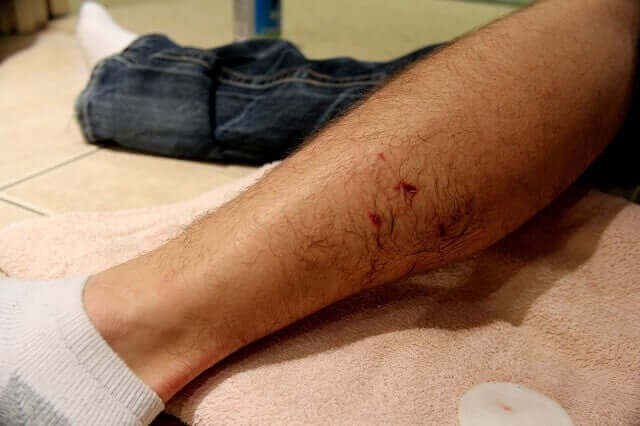After a dog attack, you need to see a physician, not only for immediate wound treatment, but you may require vaccinations and other care techniques to prevent complications. One that you may need is tetanus prophylaxis – depending on how long it has been since your last booster.
Dog bites are not uncommon in the United States, and most victims of these attacks are school-aged children. While cleaning and irrigating the wound is the first step following an attack, the next step may be a series of vaccinations. Determining whether a tetanus shot is one of them depends on a few factors your doctor must assess.
What Is a Tetanus Shot?
A tetanus vaccination, referred to medically as tetanus toxoid, is an inactive form of tetanus designed to prevent someone from contracting it. Typically, children attending school receive five doses with their sixth shot during adolescence. From there, boosters are recommended every ten years. In most cases, after three boosters, a person can be fully immunized from tetanus.
For children, they most likely received their tetanus shot as part of their DTaP, which includes diphtheria, tetanus, and whooping cough. However, adults may not have had the DTaP and were administered just the Tdap or tetanus shot alone.
Tetanus shots are safe, and there are minimal risks for side effects. More importantly, they are safe to follow up with even if it has been under ten years.
Will a Doctor Recommend a Tetanus Shot?
For small children, a tetanus shot is not likely required, mainly because they receive boosters and multiple rounds throughout early adolescence. However, a bite on an adult might require a booster, especially if it is close to the 10-year mark or over it. First, your doctor will assess your medical records to see how many booster shots you have had or where you are in your initial round of vaccinations. From there, he or she will decide if a booster is necessary.
Will You Get Tetanus If You Refuse a Shot?
Rarely would a dog bite cause tetanus unless the dog’s mouth was contaminated with soil. If the vaccine is needed or recommended by a physician, you should take the shot. Not only will this prevent you from suffering from tetanus infections, but if you were to file a dog attack lawsuit later, the court might deny you compensation for any costs, pain and suffering, or damages associated with you contracting tetanus because you refused the vaccination.
Tetanus is often recommended in high-risk patients and those who have not had a booster within that ten-year limit. Therefore, you should take the shot if your physician recommends it as part of your post-attack treatment.
Your Physician May Suggest Other Vaccinations
Another vaccination your physician may recommend is rabies. If the dog is caught after the attack, it will be tested for the rabies virus. If the rabies virus test comes back positive, then your physician will have you take a series of rabies immunoglobulin vaccinations. You usually need to involve the state health department, as these vaccinations are hard to get and highly controlled. Most hospitals do not even carry them and will need them shipped special just to administer to you.
The potential for contracting rabies from a rabid dog is high; especially if there are deep tissue wounds involved.
Therefore, never refuse to get a rabies vaccination series, regardless of how painful, if the dog tests positive.
Bacterial Infections Are Likely
Dogs, especially those that were not properly vaccinated, do carry a higher risk for infection in the wounds they inflict. Therefore, your physician may culture the wound and send it out for testing to make sure there is no bacteria present. Some common types of bacterial infections in dog bites include staph, strep, Pasteurella, and capnocytophaga.
Most of these infections, even if contracted, can be treated through either oral antibiotics or a course of intravenous antibiotics – depending on the type of infection and its extent.
Cleaning the Wound Is Key
It is imperative that you seek medical treatment immediately after a dog bite or attack. Having the wound cleaned by a medical professional will cut down the risk for infection and help you heal faster. You may need surgical intervention as well, depending on how deep the wound is or where it is located.
Seeking Compensation for Medical Treatment
Medical treatments for dog bites, especially vicious attacks, can be incredibly costly. Often, a person will need emergency room treatments. They also could require reconstructive or plastic surgery if they are bitten on their face or other areas where scarring is very visible. Likewise, the cost of special treatments, such as vaccine series for rabies, are incredibly costly.
If you or a loved one is the victim of a dog bite, you should not have to pay for any medical costs associated with that attack. Instead, you need to hold the dog’s owner accountable for your injuries and losses.
To do so, you must file an injury lawsuit against the dog’s owner. Typically, the owner uses his or her homeowner’s insurance policy to pay for your expenses. But if their policy only covers a small portion of your claim, you may need to seek compensation through assets and other means.
Regardless, you have the right to compensation when a dog’s owner is negligent and allows their animal to harm you or a family member.
You need an advocate with years of experience handling dog bite cases. Attorney Jeffrey H. Penneys, Esq. has helped countless victims receive the compensation they need for medical costs, pain, suffering, lost wages, emotional trauma, and more.
Contact Jeffrey H. Penneys, Esq., today at 215-771-0430. You can also request more information about his experience online.
